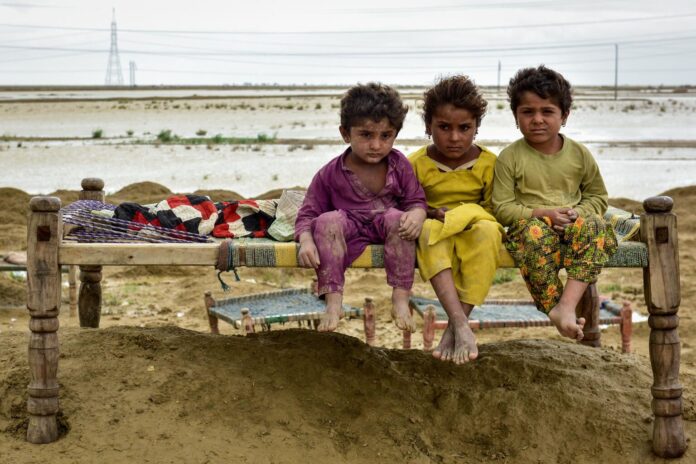Spokesman Report
GENEVA/ISLAMABAD – “Over the past few weeks, torrential monsoon rains have broken a century-long record and dumped more than five times the 30-year average for rainfall in some provinces, killing more than 1200 people, including about 400 children, while washing away or damaging over 1.1 million houses and destroying vital infrastructure children rely on to access essential services, such as schools and hospitals. At least 18,000 schools have been damaged or destroyed across the country due to the floods. We estimate that 16 million children are impacted and 3.4 million of these children are in need of humanitarian support.
“Exacerbating this horrendous situation, many of the 72 hardest-hit districts were already amongst the most vulnerable ones in Pakistan. 40 per cent of children were already suffering from stunting before the floods hit. Many children are now at heightened risk, without a home, school, or even safe drinking water.
“There is therefore a risk of many more child deaths. And the situation will only continue to deteriorate as winter is just 8 weeks away in some parts of the country.
“There is now a high risk of water-borne, deadly diseases spreading rapidly — diarrhoea, cholera, dengue, malaria. Without adequate sanitation, communities are increasingly having to resort to open defecation, putting them at high risk of contracting diseases.
“Relief and rescue operations are still extremely hard to carry-out – around 160 bridges and 5,000 kilometres (3,200 miles) of roads have been destroyed or damaged, 3.5 million acres of crops affected and about 800,000 livestock lost. Yet lifesaving rescue and relief efforts are indispensable, and UNICEF is distributing humanitarian supplies in all affected provinces.
“In terms of UNICEF’s response, we have already delivered immediate emergency services and supplies worth over USD $2 million, including drinking water, water purification tablets, hygiene kits, medicines, vaccines, therapeutic food for children, pregnant and lactating women, and mosquito nets.
“In the coming days and weeks, we aim to reach children and families first with lifesaving medical equipment, essential medicines, vaccines and safe delivery kits, safe drinking water and water-treating tablets, and sanitation supplies, nutrition supplies, mosquito nets. We also want to help children resume learning and will support the Government to reestablish critical services for children as soon as possible.
“Additional life-saving emergency medical and WASH supplies are expected to reach Pakistan from our hub in Copenhagen within days. But many more airlifts will be needed.
“In order to be able to achieve this, as part of the UN flash appeal of $160 million to support the flood response led by the Government of Pakistan, UNICEF is appealing for US$37 million to reach approximately 3.4 million children in need of life-saving support. UNICEF has launched flash appeals globally and members of the public and the private sector can make donations via the Pakistan appeals page of the UNICEF global https://www.unicef.org/appeals/pakistan.
“We urgently need these funds and resources to allow us to continue to provide lifesaving medical equipment, essential medicines, vaccines, safe drinking water, hygiene kits, mosquito nets and delivery kits, as well as funds to ensure service outreach for delivery.
“We know that any emergency like this runs the risk of increasing protection risks for children, undermining the resilience and psychosocial wellbeing of children and their parents, leaving many experiencing distress. Children are exposed to a wide range of new flood-related physical risks and hazards, including from damaged buildings, drowning in flood waters and snakes. Children with disabilities are experiencing increased vulnerability as access to essential services is disrupted. With the large numbers of displaced families, we must ensure that any children who become separated from their parents or caregivers are identified, protected and ultimately reunited with their families.
“The sad reality is, as we have seen all around the world, climate change is making extreme weather events more frequent and more destructive, and it is children who are too often paying the price.
“Pakistan ranks 14th out of 163 countries on UNICEF’s Children’s Climate Risk Index (CCRI), placing the country in the ‘Extremely high risk’ classification category in the Index. Urgent climate action is absolutely critical to protect this and future generations. As such, UNICEF urges world leaders, governments, and businesses around the world to listen to children and prioritise actions that protect them from impacts, while accelerating work to dramatically reduce greenhouse gas emissions.”



